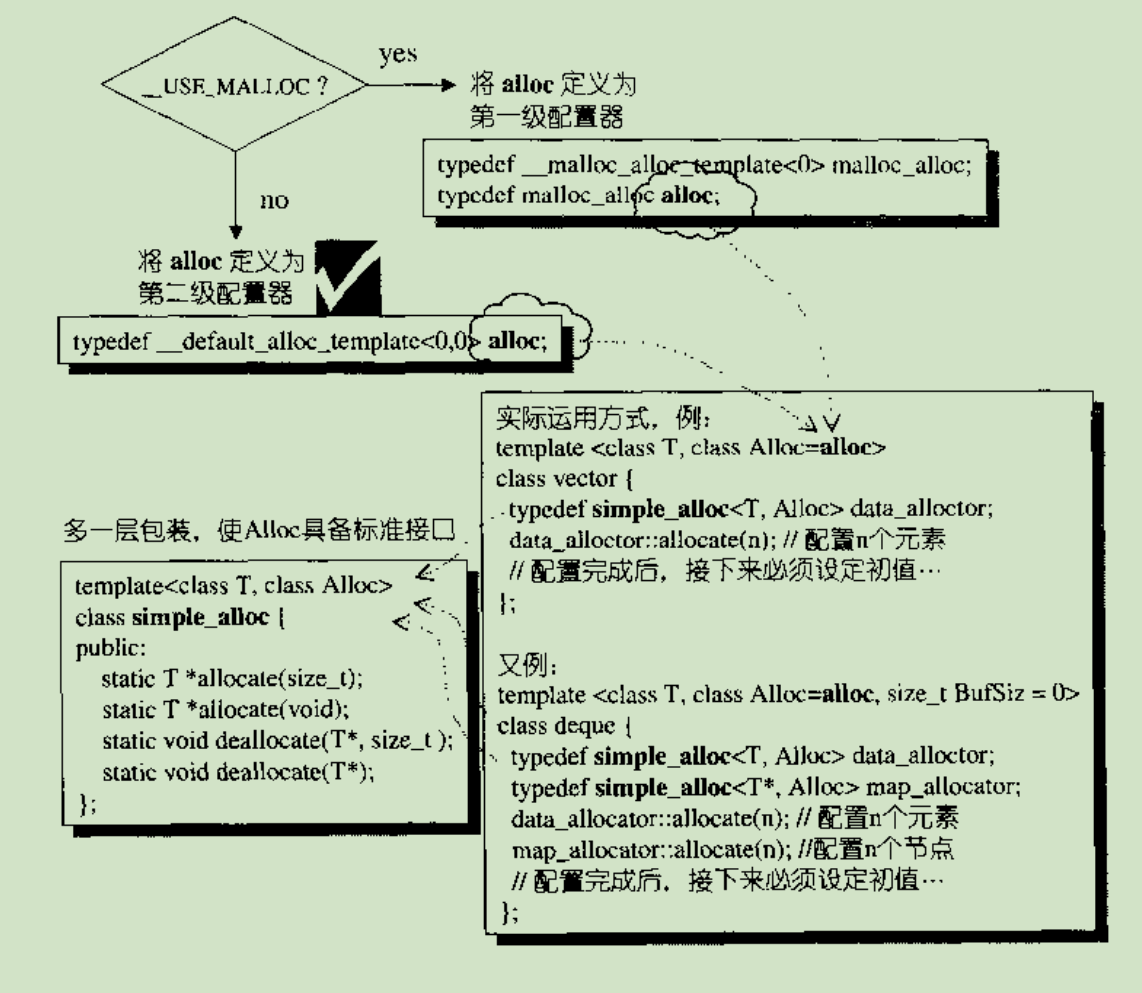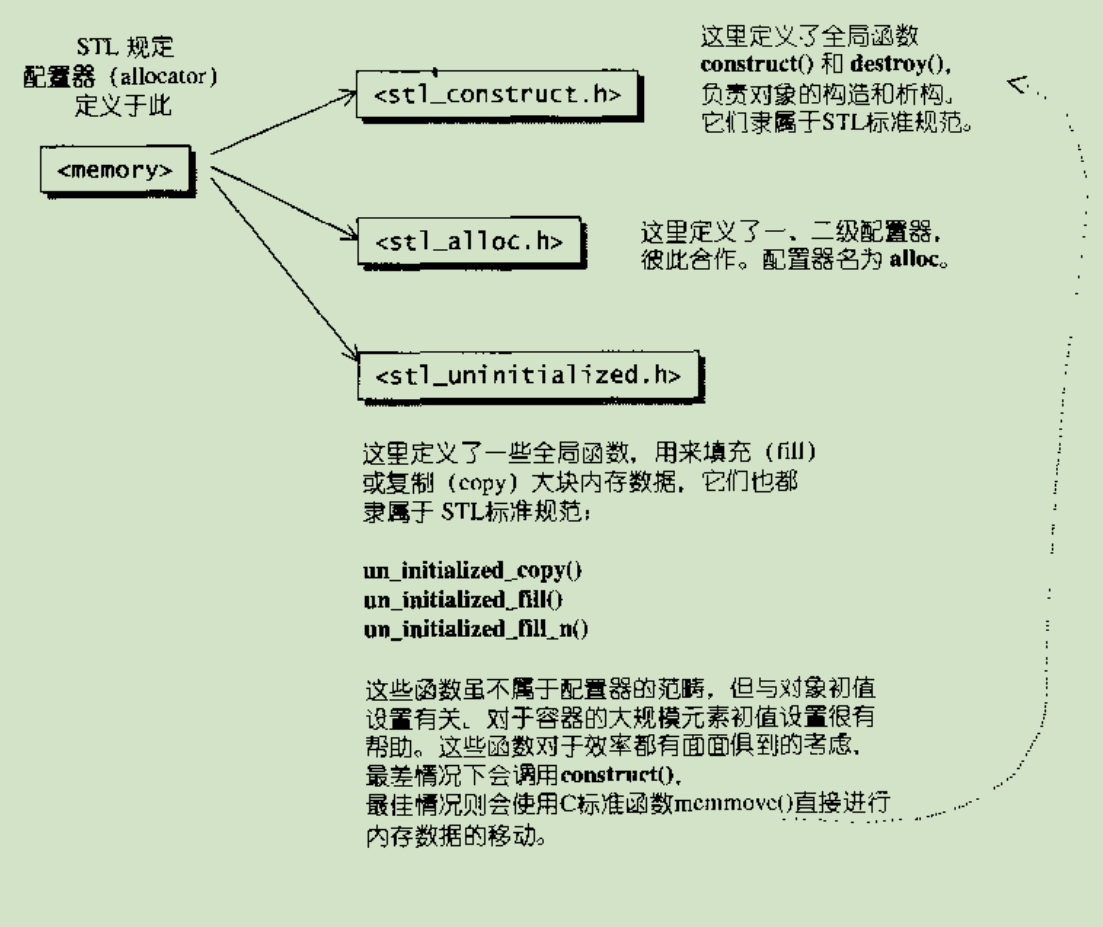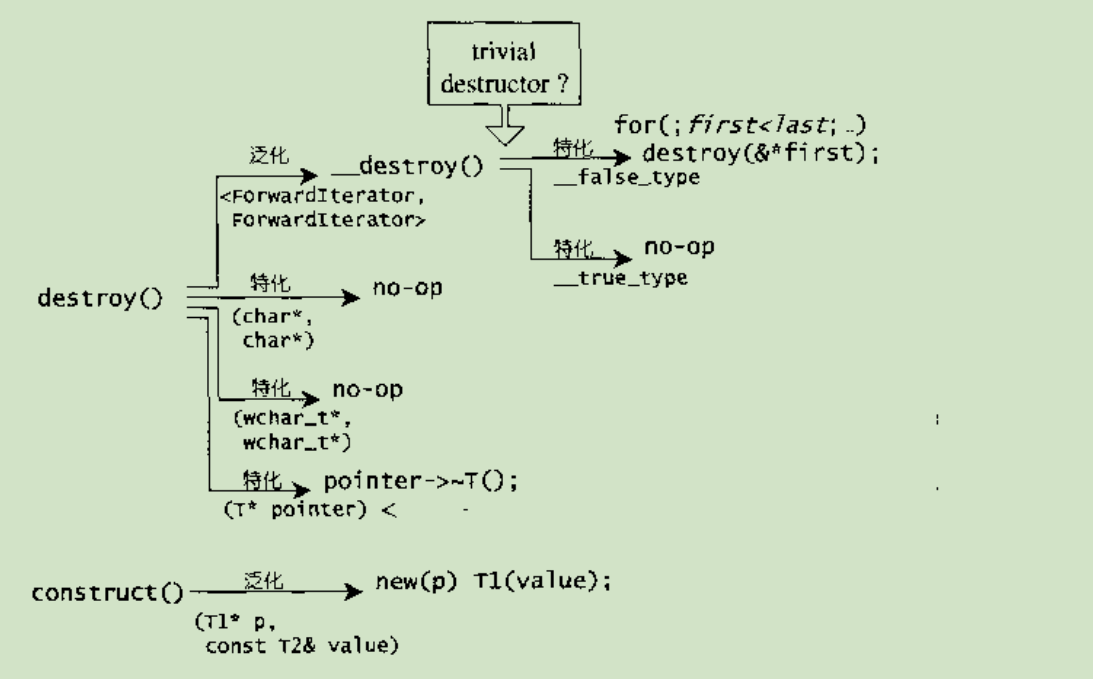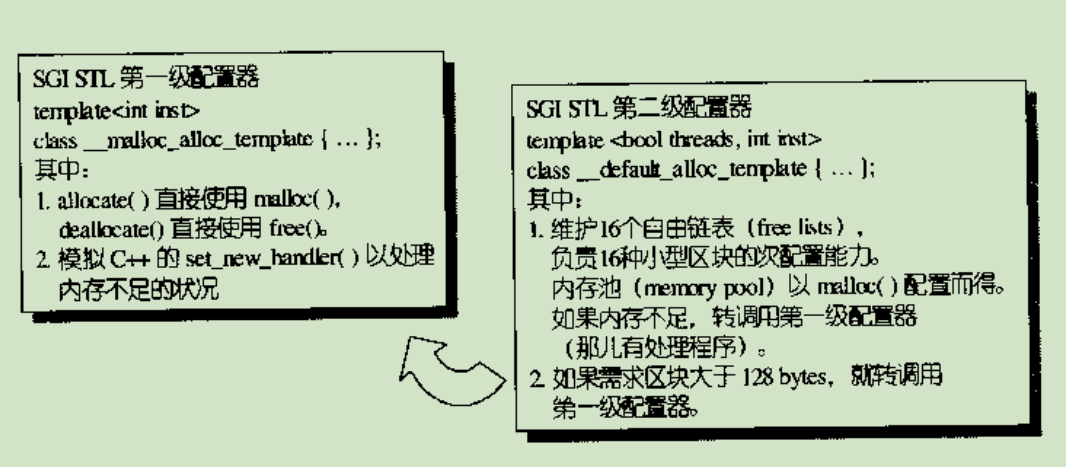1. SGI STL实现版本
SGI版本由Silicon Graphics Computer System, Inc公司发展,继承HP版本。所以它的每一个头文件也都有HP的版本声明。此外还加上SGI的公司版权声明。主要设计者仍然是STL之父Alexandar Stepanov,被Linux的C++编译器GCC所采用。SGI STL是开源软件,源码可读性非常高。
2. SGI STL的配置器与众不同,其名称为alloc,而且不用传任何参数,所以使用的时候必须写成:
vector<int , std::alloc> iv //in GCC
STL 标准规格告诉我们,配置器定义于<memory>之中,SGI <memory>内含以下两个头文件:
#include<stl_alloc.h>
#include<stl_construct.h>
具体分工如下图:
模拟实
现代码:
#pragma once
namespace 51CC
{
template<class T>
T* _allocate(ptrdiff_t size, T*)
{
//set_new_handler(0);
T *tmp = (T*)(::operator new(size*sizeof(T)));
if(tmp == 0)
{
cerr<<"Out Of Memory."<<endl;
}
return tmp;
}
template<class T>
void _deallocate(T *buffer)
{
::operator delete(buffer);
}
template<class T1, class T2>
void _construct(T1 *p, const T2 &value)
{
new(p) T1(value);
}
template<class T>
void _destroy(T *ptr)
{
ptr->~T();
}
template<class T>
class allocator
{
public:
typedef T value_type;
typedef T* pointer;
typedef const T* const_pointer;
typedef T& reference;
typedef const T& const_reference;
typedef size_t size_type;
typedef ptrdiff_t difference_type;
public:
pointer allocate(size_type n, const void*hint = 0)
{
return _allocate(n, (pointer)0);
}
void deallocate(pointer p, size_type n)
{
_deallocate(p);
}
void construct(pointer p, const T &value)
{
_construct(p, value);
}
void destroy(pointer p)
{
_destroy(p);
}
};
};
construct() 和destroy()的示意图:
3. std::alloc中的一级及二级空间配置器模拟实现代码:
#pragma once
#if 0
#include<new>
#define __THROW_BAD_ALLOC throw bad_alloc
#elif !defined(__THROW_BAD_ALLOC)
//#include<iostream.h>
#define __THROW_BAD_ALLOC cout<<"Out Of Memory."<<endl; exit(1)
#endif
template<int inst>
class __malloc_alloc_template
{
public:
static void* allocate(size_t n)
{
void *result = malloc(n);
if(result == 0)
result = b(n); //
return result;
}
static void deallocate(void *p, size_t)
{
free(p);
}
static void* reallocate(void *p, size_t old_sz, size_t new_sz)
{
void *result = realloc(p, new_sz);
if(0 == result)
result = oom_realloc(p, new_sz);
return result;
}
private:
static void * oom_malloc(size_t n);
static void * oom_realloc(void *p, size_t n);
static void(*__malloc_alloc_oom_handler)();
};
template<int inst>
void(* __malloc_alloc_template<inst>::__malloc_alloc_oom_handler)() = 0;
template<int inst>
void* __malloc_alloc_template<inst>::oom_malloc(size_t n)
{
void(*my_malloc_handler)();
void *result;
for(;;)
{
my_malloc_handler = __malloc_alloc_oom_handler;
if(0 == my_malloc_handler)
{
__THROW_BAD_ALLOC;
}
(*my_malloc_handler)();
result = malloc(n);
if(result)
return result;
}
}
template<int inst>
void* __malloc_alloc_template<inst>::oom_realloc(void *p, size_t n)
{
void(*my_malloc_handler)();
void *result;
for(;;)
{
my_malloc_handler = __malloc_alloc_oom_handler;
if(0 == my_malloc_handler)
{
__THROW_BAD_ALLOC;
}
(*my_malloc_handler)();
result = realloc(p, n);
if(result)
return result;
}
}
/////////////////////////////////////////////////////////////////////////
enum {__ALIGN = 8};
enum {__MAX_BYTES = 128};
enum {__NFREELISTS = __MAX_BYTES / __ALIGN};
template<bool threads, int inst>
class __default_alloc_template
{
public:
static void *allocate(size_t n)
{
void *result;
return result;
}
static void deallocate(void *p, size_t n);
static void* reallocate(void *p, size_t old_sz, size_t new_sz);
private:
static size_t ROUND_UP(size_t bytes)
{
return (bytes+__ALIGN-1) & ~(__ALIGN-1);//
}
union obj
{
union obj * free_list_link;
char client_data[1];
};
private:
static size_t FREELIST_INDEX(size_t bytes)
{
return (bytes + __ALIGN - 1) / __ALIGN-1;
}
private:
static obj * free_list[__NFREELISTS];
static char *start_free;
static char *end_free;
static size_t heap_size;
};
template<bool threads, int inst>
char* __default_alloc_template<threads, inst>::start_free = 0;
template<bool threads, int inst>
char* __default_alloc_template<threads, inst>::end_free = 0;
template<bool threads, int inst>
size_t __default_alloc_template<threads, inst>::heap_size = 0;
//typename
template<bool threads, int inst>
__default_alloc_template<threads, inst>::obj*
__default_alloc_template<threads, inst>::free_list[__NFREELISTS] =
{0,0,0,0,0,0,0,0,0,0,0,0,0,0,0,0};

参考文献:STL源码剖析(简体)


